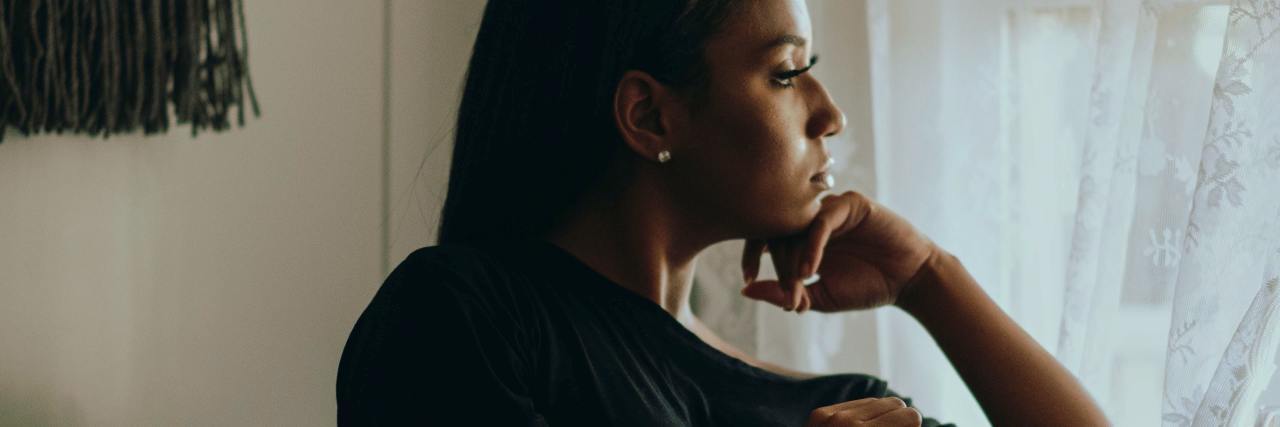Why I Have Reservations About Seeing a Black Therapist as a Black Woman
Editor's Note
If you’ve experienced domestic violence or emotional abuse, sexual abuse or assault, the following post could be potentially triggering.
You can contact The National Sexual Assault Telephone Hotline at 1-800-656-4673.
You can contact The National Domestic Violence Hotline online by selecting “chat now” or calling 1-800-799-7233.
You can also contact the Crisis Text Line by texting “START” to 741741.
I have been in therapy most of my adult life and during that time, I have had one Black therapist. Truth be told, I do not like having a Black therapist. I feel I cannot trust her. That somehow, she will go back to the Black community and “tell on me.” That she will tell that I exposed my family’s dirty laundry, and this is out of school for the Black community.
I was raised that you do not tell what goes on behind the closed doors of your home. So, I have always been reluctant to tell my horror story to Black people. I feel they will be mad that I am speaking ill of my father because it is a no-no to speak ill of Black men, and I worried they would not believe me. I feel confiding in a therapist would mean I broke the code. I would be betraying my father since he did do a lot of good things for me growing up and I am just trashing him out of spite. My mother did not believe me, so I think a Black female therapist, under all her professional façade, would not believe me. How could I possibly build trust under these circumstances?
I currently see a white therapist. She is highly skilled in the specialized therapy I need. I have been working with her for 16 years. We have an awfully close relationship and I trust her completely. My work with her is very productive. I do not feel I am breaking any confidences with her. I do still worry about telling on my abusers, but it is different with her. I know she will not report back my airing of my family’s dirty laundry.
Then the Black Lives Matter movement came along and I really began to grieve about all the racial oppression and violence I had been living under. My trusted skilled therapist could no longer meet my needs. Some may say trauma is trauma, and she should be able to help me through this. That is not true because I tried. She was empathetic and caring and said a lot of the right things, but it was not enough. I am struggling and cannot see my way out of it. I spoke with my therapist about this disconnect. We discussed how she might improve. After I rejected that as possible, we came to the decision that I would enlist a temporary Black female therapist to address my racial trauma grief.
My therapist did not have any recommendations for me that took my insurance. So I turned to Psychology Today for a list of therapists. I found a few candidates in my area, though turns out this did not matter since everything is virtual. I read their bios and their areas of expertise. I had to make sure they were Black, trauma-informed and addressed racial trauma, that they took my insurance and were lesbian-friendly. I found someone who met all of my needs, so I called her and then emailed her and got no response, so I moved on. I waited a couple of weeks. My issues did not seem as acute anymore, but I was still struggling. I finally did my research again and called another woman, and she responded very quickly. She sounded nice on the phone and willing to work with me. I told her I already had a therapist and was looking to work on racial trauma and could not do that with my current therapist. I explained that I would not stop seeing my current therapist and that I wanted to see her for six to eight sessions to gain some skills to deal better with racial trauma issues. I did specifically ask about the lesbian issue since I run into a lot of prejudice from Black people about my sexuality. She stated she took a whole person approach and had other lesbian women in her practice. I felt comfortable enough to make an appointment.
As I get closer to the appointment, I think about all my fears about speaking about my family and I am scared. How will she respond? Will she doubt me? Will I be able to trust her with my secrets? Will she judge me negatively? Will I get the feeling from her that she is not safe?
I brought up my concerns in my therapy appointment with my White therapist and she encouraged me to be upfront about my concerns — to just put my fears on the table and see how she responds, instead of wondering what she is thinking. She stated that if the new Black therapist and I are going to have a productive therapeutic relationship, I need to be honest about my fears.
I think she is right. I want this short time I spend with this therapist to be as productive as possible and that means I must be as open and honest as I can be. I am going to take the plunge and trust that I am going to get all I can out of this relationship.
So, wish me luck.
Maya Lorde
Photo by DeMorris Byrd on Unsplash

